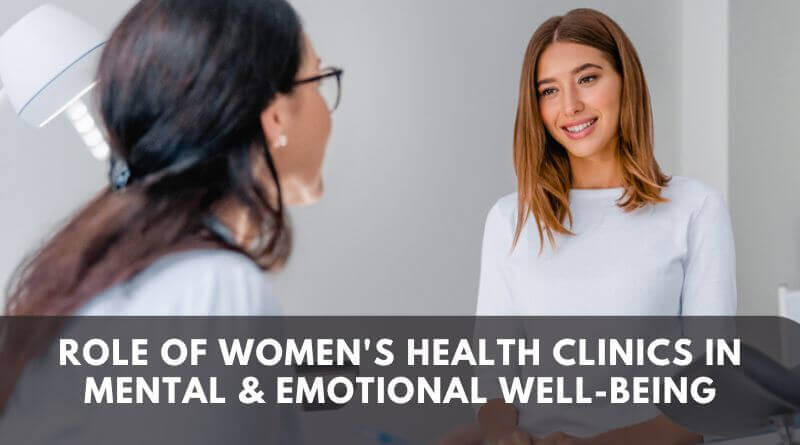Supporting Women’s Health: The Role of Women’s Health Clinics in Mental & Emotional Well-Being
Women’s health is an intricate tapestry of physical, mental, and emotional well-being. In recent years, there has been a growing recognition of the vital role a women’s health clinic plays in addressing not only the physical aspects but also the mental and emotional aspects of health. See how women’s health clinics contribute to mental and emotional well-being and why a holistic approach to women’s health is crucial.
Table of Contents
Understanding Women’s Health Holistically
Women’s health encompasses various aspects of well-being, including reproductive, heart, bone, and mental and emotional health. A holistic approach that considers all these facets is essential to support women’s health.
The Impact of Mental & Emotional Health on Physical Health
Mental and emotional health are not isolated from physical health; they are deeply interconnected. Stress, anxiety, and depression can manifest physically, affecting a woman’s overall health. For example, chronic stress can lead to cardiovascular issues, weaken the immune system, and disrupt hormonal balance. Recognizing this connection, women’s health clinics have begun to address mental and emotional health as integral components of overall well-being.
The Role of Women’s Health Clinics
Women’s health clinics have evolved to provide comprehensive care beyond routine check-ups and screenings. They now offer various services and programs to promote mental and emotional well-being.
- Mental Health Screenings: Women’s health clinics routinely incorporate mental health screenings into their assessments. These screenings help identify issues like anxiety, depression, or postpartum depression early on, allowing for timely intervention and support.
- Emotional Support: Emotional support is fundamental to women’s health clinics. They offer a safe space for women to discuss their concerns, fears, and emotional challenges. Clinics often have licensed therapists or counsellors specializing in women’s mental health.
- Support Groups: Many women’s health clinics organize support groups focusing on mental and emotional health aspects. These groups create a community where women can share their experiences, learn coping strategies, and gain a support system.
- Nutritional Counselling: Nutrition plays a significant role in mental and emotional well-being. Women’s health clinics may provide nutritional counselling to help women make dietary choices that support their mental health, such as foods rich in essential nutrients like omega-3 fatty acids, which are known to benefit brain health.
- Exercise & Stress Reduction Programs: Regular physical activity benefits physical health and mental and emotional well-being. Women’s health clinics may offer exercise programs tailored to their patient’s unique needs and preferences. Stress reduction programs like yoga and mindfulness meditation are often part of clinic offerings.
The Importance of Reproductive Health
Reproductive health is a significant component of women’s health and has its own mental and emotional considerations. Women’s health clinics provide various reproductive health services, including family planning, contraception, prenatal and postnatal care, and fertility support. These services often include counselling and emotional support to address reproductive health’s mental and emotional aspects.
Family Planning & Contraception Counselling
Women’s health clinics offer comprehensive family planning services, including counselling on contraceptive options. These discussions encompass not only the physical aspects of contraception but also the emotional and lifestyle considerations that women may have.
Prenatal & Postnatal Support
Pregnancy and the postpartum period can bring about a wide range of emotions, from joy and excitement to anxiety and mood swings. Women’s health clinics provide prenatal and postnatal care, including mental and emotional support for expectant and new mothers.
Fertility Support & Counselling
For women experiencing fertility challenges, women’s health clinics offer support and counselling services. Dealing with infertility can be emotionally taxing, and having access to specialized care and emotional support can make a significant difference.
Navigating Life Transitions
Women experience unique life transitions that can profoundly impact their mental and emotional well-being. Women’s health clinics are equipped to guide and support women through these transitions.
Menopause Support
The menopausal transition can be challenging for many women, marked by physical and emotional changes. Women’s health clinics provide information, counselling, and treatment options to help women navigate this phase of life with confidence and grace.
Adolescent Health Services
Teenage girls often face emotional and mental health challenges as they navigate adolescence. Women’s health clinics offer age-appropriate services that address the specific needs of young women, including education on emotional health and self-esteem.
Trauma-Informed Care
Many women have experienced trauma, which can affect their mental and emotional well-being. Women’s health clinics increasingly adopt trauma-informed care approaches, creating a safe and supportive environment for trauma survivors.
A Collaborative Approach
Women’s health clinics recognize the importance of collaboration in providing holistic care. They often work in partnership with mental health professionals, social workers, nutritionists, and other specialists to address the diverse needs of their patients. This collaborative approach ensures that women receive comprehensive and individualized care.
The Stigma Surrounding Women’s Mental Health
Despite significant progress, there remains a stigma around mental health, especially women’s mental health. Women’s health clinics are vital in challenging and dispelling this stigma. They create an atmosphere of openness and acceptance, where women feel comfortable discussing their mental and emotional health without judgment.
A women’s health clinic can encompass the physical, mental, and emotional aspects of well-being nowadays. They provide vital services, support, and resources to help women lead healthier, happier lives. By recognizing the interconnectedness of these facets of health and adopting a holistic approach, women’s health clinics empower women to prioritize their mental and emotional well-being alongside their physical health. The journey to comprehensive women’s health care is ongoing. Still, the progress made so far is a testament to the dedication of healthcare providers and the resilience of women in their pursuit of well-rounded health and well-being.
Recommended Articles:
Steps to Ensure Women’s Health
Best Careers in Women’s Health




